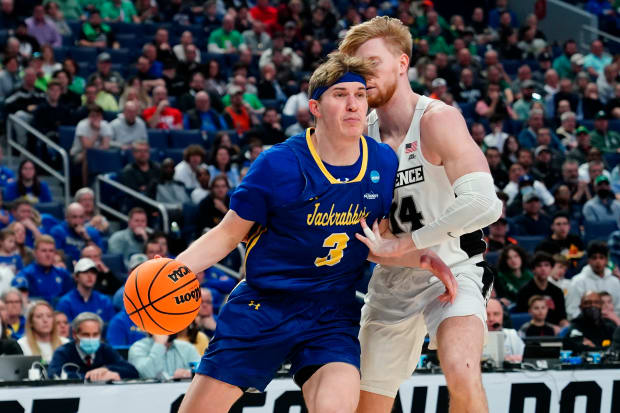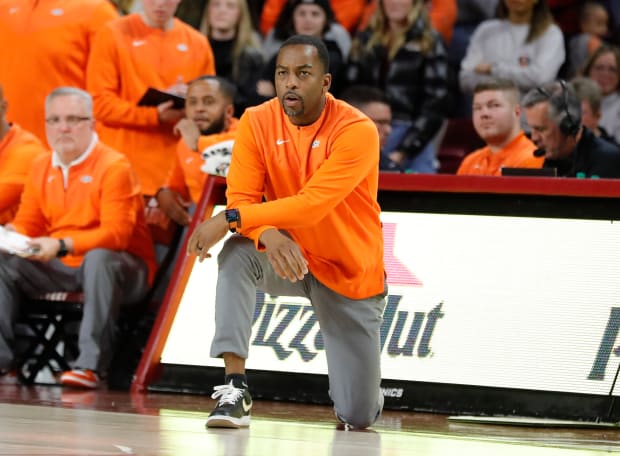College basketball's infamous portal serves as a fun business for players, point of stress for coaches.

Gregory Fisher-USA TODAY Sports
Four years ago when Baylor Scheierman was fielding calls from the two low-major schools interested in landing him, he never envisioned that one day he’d be hearing pitches from the country’s top college coaches about their plan to make him one-and-done.
Ask Kendric Davis where he was ranked in high school and all he can give you is a ballpark “high hundreds,” but his ability to reel off the list of players ranked ahead of him is impressive and downright scary.
“I was a four-star recruit by default because I was signed to the Big 12,” Davis says. “The recruiting experience as a transfer is night and day different.”
RELATED: Power-Brokers Poised to Turn NCAA Upside Down
Davis and Scheierman are just two of more than 1,400 college players in the transfer portal who contend that while greener pastures have brought on once-desired status and attention—from NIL-focused pitches to agent intervention to Power 5 coaches’ pleas—life as a college journeyman is hectic.
“When I first announced my transfer from South Dakota State, I was taking about 50 calls the first day,” Scheierman says. “I didn’t know what to expect, but, man, I wasn’t ready for that.”
Perhaps he should’ve been after pumping in 19.5 points, 9.4 rebounds and 5.4 assists while draining 46.9% from three and winning Summit League Player of the Year this season.
His production makes him nearly as attractive as a top 10 high school star since the NCAA ratified a rule last year allowing transfers to play right away as opposed to sitting out a year. The spiel and the attention tend to be different when proven.
Davis was equally dominant this season at SMU, posting 19.4 points, 3.8 rebounds and 4.4 assists to earn American Athletic Conference Player of the Year.
He never felt so popular after entering the transfer portal, receiving calls and texts from famous alums of the schools recruiting him, including Memphis Grizzlies star Ja Morant who stepped away from NBA playoffs prep to remind Davis that they could “turn up the city!” if he came to Memphis.
“Man, there are a lot of fun things that come with this process,” says Davis, who committed to Memphis on April 22. “When the coaches reach out, it’s very much business-like; I was hearing stuff about how they could help me improve my draft stock whereas in high school they were saying they think I could be a key contributor for the team.”
RELATED: Kendric Davis Blogs About Commitment to Memphis
Scheierman wasn’t too far removed from his teenage playing days to forget that he’d always dreamed of getting tired of top college coaches blowing his phone up trying to convince him to sign on.
Talk about a full-circle moment; Scheierman grew up a Kansas fan, the Jayhawks won the national title on April 4 and here comes Bill Self on line one three weeks later trying to convince Scheierman to help him repeat.
“I’m just a kid from small-town Nebraska, so this is special to me,” says Scheierman, who picked Creighton over Arkansas, Clemson, Duke and Nebraska on Tuesday. “You look at the phone and see that Bill Self is calling and John Calipari is calling and guys like that, it’s as wild as you think it is. Once it all sets in after a few days, the biggest difference is how fast you have to go through the process.”
Adding to the chaos that is the life of a college basketball transfer, Scheierman and Davis declared for the NBA draft; Davis more for information gathering purposes, but Scheierman is fully dialed into making his NBA dreams a reality.
RELATED: Adding Scheierman, Creighton Can Stake Claim for No. 1
“I just don’t think you can go through that process halfway,” Scheierman says. “So, I’m two feet in with the draft process. I think I’m gonna get an invite to the combine, and if I play well there and have a good pro day who knows what can happen. That said, a big reason for entering the portal was to play on a bigger stage and ultimately help my draft stock for next year if I do have to go back. There’s a lot to weigh out.”
College coaches feel the stress from the other end and contend that, while portal recruitment is vastly different from recruiting high school talent, new NIL rules have taken the process from crazy to cringy.
The biggest adjustment?
Contacting a player directly and hearing three key words: Call my agent.

Alonzo Adams-USA TODAY Sports
“That still takes some getting used to,” Louisville associate head coach Nolan Smith says. “There are still some that say to call my mom or dad or AAU coach, but ‘agent’ is normal now. A lot of times agents are gonna ‘agent’ you. You just have hope that you’re dealing with a good person in the agent that’s gonna be real with you and not try and gouge you with NIL and take advantage of the situation. You pick and choose which ones you want to deal with, and you learn that pretty fast. We’re all adjusting; it’s new for everyone.”
NIL dollars only make the process more arduous as the price for top-tier transfers continues to rise.
Recently, all Big 12 guard Nijel Pack, the top-ranked transfer in SI’s top 25, announced he was transferring from Kansas State to Miami and signed a reported two-year $800,000 NIL deal to promote LifeWallet. The deal also included a new car.
“We’re having to recruit like this is professional sports,” Oklahoma State coach Mike Boynton says. “It’s been really, really difficult because you have to make a decision on what you’re gonna stand for. Obviously, no one wants to compromise their ability to have success, but now there’s a financial market for good players. It happened before in the shadows, but now it’s a free market. Basically, there are no rules.”
For that reason, Scheierman had a preemptive chat with his agent and parents about his desire to focus on the long game.
“A lot of people think that we’re all going to the portal for big NIL deals,” Scheierman says. “It would be a blessing to make money off what I worked for, sure; but the biggest thing is fit for me. Yeah, I could get a one-year deal with NIL that’s big, but if I played 10 years in the NBA I think that would work out for me a lot better.”
That mindset would’ve made Scheierman more attractive to Kentucky coach John Calipari.
On Monday, the Wildcats coach drew his line in the sand on NIL payments during the transfer process during a guest spot on a Louisville radio show.
“The problem is the name, image and likeness should not be a part of it and it’s become a part of it,” Calipari said on SportsTalk with Kentucky Hall of Famers Dan Issel and Mike Pratt. “And if anybody is talking to me about name, image and likeness as part of the transfer, I’m not really interested. You come here because of the culture, to be developed, the environment, the fans, trying to compete for national titles.”
Davis couldn’t agree more with the mentality; one of the main reasons he picked the Tigers was to learn under the tutelage of a man whose career he’d “hope to” duplicate someday.
“That’s the real win, playing for Coach Penny [Hardaway],” Davis says. “He’s done it and I know he can get me to another level so I can have a long NBA career. You have to think about things long-term at this point. This is my second time going through the transfer process, so I understand it at a different level. It’s a business decision, and you have to approach it like that in every way.”